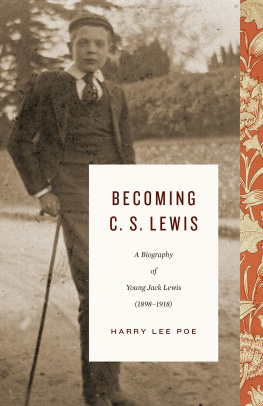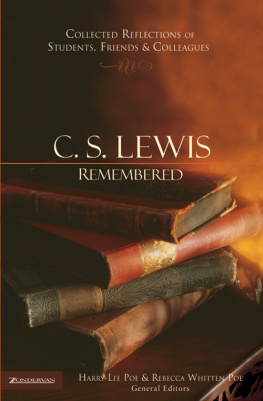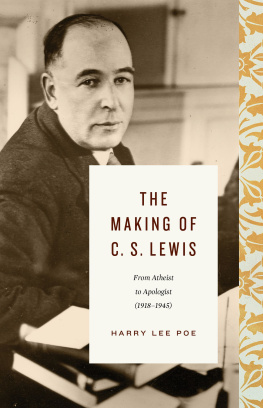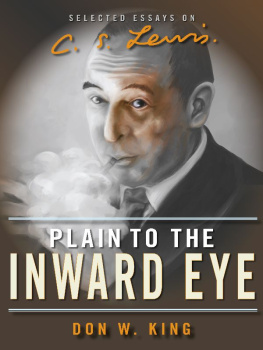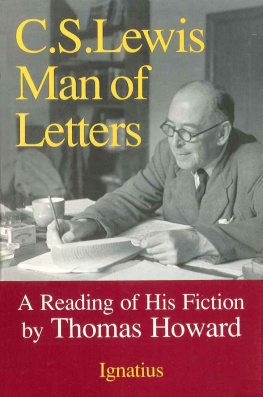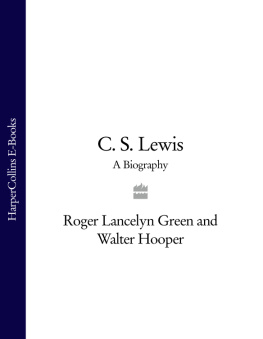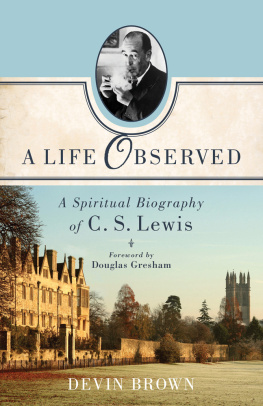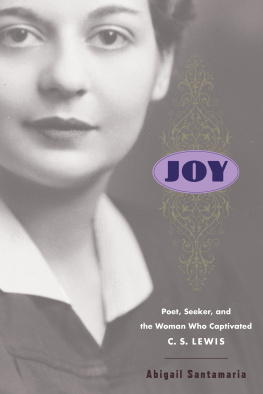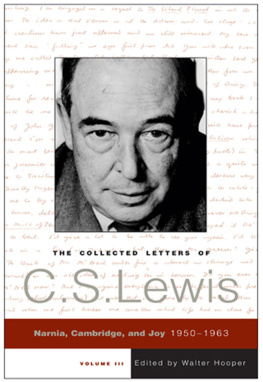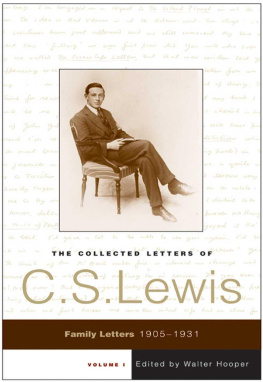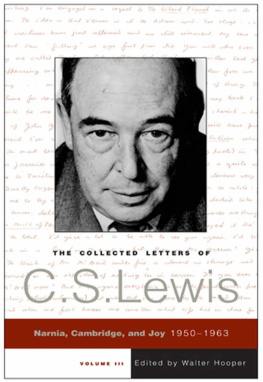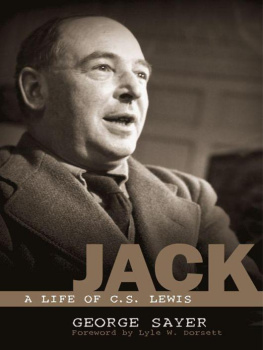Table of Contents
Landmarks
19601963
As she lay dying, Joy asked that Jack arrange for her cremation. She declared that posh coffins are all rot.
Douglas and Warnie had been absolute Bricks through Joys death and funeral, but Douglas went back to school and Warnie fled to Ireland to console himself.
A few days later, Jack wrote another letter to Kay Farrer in which he made clear how he was feeling. She had let him know that they would not bother him so that he could get some rest. He replied:
Come up any day that suits. Not seeing you two wd. never be a rest. Nor am I sure that rest is what I need. Im learning a good many things about grief wh. the novelists and poets never told me. It has as many different facets as love or anger or any other passion. In the lullsbetween the peaksthere is something in it v. like fidgety boredom: like just hanging about waitingtho what the deuce one thinks he is waiting for I dont know.
When I first became a pastor years ago, our small church had a funeral every week for eight weeks, and then it slacked off to one every other week. The questions Lewis asked are among the standard questions that people of faith who have loved dearly tend to ask. They are questions that occur to few peopleeven, or especially, pious peoplebefore death intrudes and the great separation comes. Lewis handled himself in a very healthy way. He did not cut himself off from others but sought company. He did not withdraw from his work but threw himself into it and stayed busy. He let his emotions flow and did not try to be appropriate.
Once school was out, Douglas returned to the Kilns to be for Lewis an absolute brick, and a very bright spot in his life.
A Grief Observed
While Warnie was away in August, Lewis invited Roger Lancelyn Green to visit at the Kilns. As it happened, Dimidius did not appear on the title page.
Eliot accepted the manuscript with a letter to Curtis Brown:
I and two other Directors have read A Grief Observed . My wife has read it also, and we have all been deeply moved by it. We do in fact want to publish it.... We are of the opinion that we have guessed the name of the author. If, as you intimate and as I should expect from the man I think it is, he does sincerely want anonymity, we agree that a plausible English pseudonym would hold off enquirers better than Dimidius. The latter is sure to arouse curiosity and there must be plenty of people amongst those who know him, and perhaps even among the readers of his work who do not know him, who may be able to penetrate the disguise once they set their minds working.
Exactly twenty years had passed since Lewis published The Problem of Pain . In its preface, Lewis confessed that he found serious pain intolerable, but that he did not write to address the feelings associated with pain or suffering. Instead, Lewis said:
The only purpose of the book is to solve the intellectual problem raised by suffering; for the far higher task of teaching fortitude and patience I was never fool enough to suppose myself qualified, nor have I anything to offer my readers except my conviction that when pain is to be borne, a little courage helps more than much knowledge, a little human sympathy more than much courage, and the least tincture of the love of God more than all.
A Grief Observed provides the other bookend to The Problem of Pain , giving the expression of the feelings associated with suffering, without any intellectualizing. In The Abolition of Man , Lewis had explored what happens when the head and the belly roam free without the magnanimity of the chest to keep them in balance. With these two books, we see exactly what he meant, and we see how balance finally came at the end.
It was a brilliant stroke. With A Grief Observed , however, he faced the counterpoint. What if God were a monster and we had been wrong all along to call God good?
Small lines he had written to friends in letters appear in expanded form in A Grief Observed as major preoccupations of his mind during August, such as Where is she now?... [at] the present time, and, If the dead are not in time, or not in our sort of time, is there any clear difference, when we speak of them, between was and is and will be ?
The thoughts and fears must have come fast and furious for Lewis, and he poured himself onto the pages of his little notebook. He probably wrote the first half of A Grief Observed between Thursday, July 21, when he wrote to the Farrers about his experience of
Lewiss fears that God might actually be a Cosmic Sadist began to subside as the sun came out following a series of cloudy days, and as he finally was able to get a good nights sleep. He gradually came to feel that the door is no longer shut and bolted, and he wondered if his own frantic need had slammed it in his face.
Douglas was continuously described by Joy and Jack as a sweet boy, but he also has much of his mother about him, and no doubt, his mere presence uniquely brought comfort to Lewis and refreshed the memory of Joy.
By the last section of the book, Lewis had recovered his ability to think reflectively about death as a true believer with confidence He was fragile and he recognized it, in spite of his brave public face.
An Experiment in Criticism
In one sense, Jack began writing this book on February 1, 1916, when he wrote to Arthur, You really lose a lot by never reading books again.
Through his pleasure reading at Great Bookham, Lewis had formed his basic ideas about literary judgment that he finally organized and expressed in An Experiment in Criticism . On November 1, 1916, he wrote to Greeves:
If a person was really a book-lover, however ignorant, he wouldnt go and look up a text book to see what to buy, as if literature was a subject to be learned like algebra: one thing would lead him to another & he would go through the usual mistakes & gain experience. I hate this idea of forming a taste. If anyone like the feuilletons in the Sketch better than Spenser, for Heavens sake let him read them: anything is better than to read things he doesnt really like because they are thought classical.
Lewis pointed out the fallacy of Eliots view in a few biting paragraphs.
Eliot was one thing, but with F. R. Leavis and his devoted followers at Cambridge, Lewis found a more pervasive and pernicious approach to literary criticism that had come to dominate literary thought. Leavis set himself up as the judge of what was good and bad in literature. Usually, old books were bad books. In a letter to J. B. Priestly on September 18, 1962, Lewis expressed his concern for the state of English Literature as a subject. His concern centered on Leavis and his approach to literature:
My hope was that it would be primarily a historical study that wd. lift people out of (so to speak) their chronological provincialism by plunging them into the thought and feeling of ages other than their own: for the arts are the best Time Machine we have.
But all that side of it has been destroyed at Cambridge and is now being destroyed at Oxford too. This is done by a compact, well-organized group of whom Leavis is the head. It now has a stranglehold on the schools as well as the universities (and the High Brow press). It is too open and avowed to be called a plot. It is much more like a political partyor Inquisition.
Leavis himself is something (in the long run) more fatal than a villain. He is a perfectly sincere, disinterested, fearless, ruthless fanatic. I am sure he would, if necessary, die for his critical principles: I am afraid he might also kill for them. Ultimately, a pathological typeunhappy, intense, mirthless. Incapable of conversation: dead silence or prolonged, passionate, and often irrelevant, monologue are his only two lines. And while he is in fact the head of the most powerful literary Establishment we have ever had since Boileau, he maddeningly regards himself as a solitary martyr with his back to the wall.


